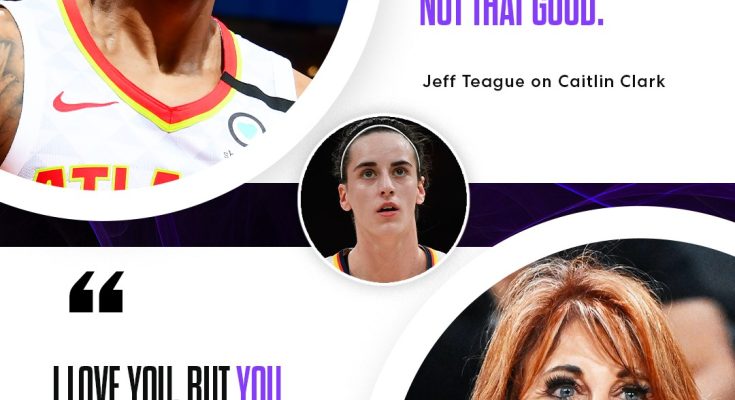Nancy Lieberman’s recent remarks on Jeff Teague’s comments about Caitlin Clark have stirred quite the conversation in basketball circles. Teague, a seasoned NBA veteran and someone with a strong basketball pedigree, stated on The Big 3 Podcast that Caitlin Clark isn’t “that good.” This statement is surprising, especially given Clark’s remarkable rise in women’s college basketball and the buzz surrounding her performances. Lieberman’s response, reflective of her deep understanding of the game and her experience both on the court and in broadcasting, offers a counter-narrative that deserves unpacking.
To begin with, Caitlin Clark has quickly become one of the most electrifying talents in college basketball. Her style of play combines shooting prowess, court vision, and a competitive fire that few players exhibit. Clark’s ability to hit shots from seemingly anywhere on the floor and her knack for threading perfect assists make her a dual-threat that defenses struggle to contain. Beyond raw statistics, her influence on games and her leadership on the court are palpable. She doesn’t just put up numbers; she changes the dynamics of how her team operates, often making her teammates better simply by being on the floor. Given all this, for someone like Jeff Teague to downplay her ability with a comment as stark as “not that good” naturally invites skepticism and pushes analysts and fans to reconsider what criteria define greatness.
Nancy Lieberman, who has a storied history in basketball herself, embodies a deep appreciation for the nuances of the game. She knows firsthand what it takes to succeed at high levels. When she addresses Teague’s dismissal of Clark’s talent, she seems to advocate for a more nuanced and appreciative perspective on what Clark brings to the table. Lieberman’s remarks suggest that evaluating a player’s skill solely on traditional metrics or through a narrow lens fails to capture the true impact Clark has on the game. For Lieberman, Clark’s intangibles—her creativity, basketball IQ, and the way she stretches defenses—are just as vital as her statistical output.
Moreover, Lieberman likely recognizes the broader context in which Clark plays. Women’s college basketball has evolved tremendously, with players now displaying athleticism and skill levels that rival many men’s programs. The game’s pace and complexity have increased, and players like Clark epitomize this new era of basketball talent. To dismiss Clark’s abilities as “not that good” arguably ignores this evolution and undermines the hard work and dedication female athletes invest in their craft. Lieberman’s rebuttal may thus be seen as a defense not just of Clark but of the broader respect and recognition that women’s basketball deserves.
Another angle to consider is the different basketball experiences and backgrounds that might shape Teague’s and Lieberman’s viewpoints. Jeff Teague’s NBA experience, primarily as a point guard, lends him insight into the physical and mental demands of professional men’s basketball. His standards for what constitutes “greatness” might lean heavily on attributes like elite athleticism, consistency against the world’s best players, and impact at the highest competitive levels. Meanwhile, Nancy Lieberman’s background spans playing, coaching, and broadcasting women’s basketball, giving her a perspective that appreciates the unique challenges and achievements within the women’s game. These different lenses can lead to divergent opinions about players like Clark, who have yet to transition to professional leagues but already show incredible promise.
Lieberman’s commentary also highlights an important conversation about gender bias in sports analysis. Female athletes often face more skepticism and harsher scrutiny compared to their male counterparts. Comments like Teague’s can unintentionally feed into a narrative that undervalues female athletes’ accomplishments. Lieberman’s pushback, therefore, serves as a critical reminder to evaluate athletes on their merits without allowing outdated biases to color judgments. Clark’s skill set and competitive spirit demand recognition that transcends gendered expectations.
It’s also worth noting the influence of media platforms like The Big 3 Podcast in shaping public perceptions. When influential voices make sweeping statements about up-and-coming athletes, those opinions can ripple through fan bases and casual observers. Lieberman’s response acts as a corrective, encouraging a more balanced and informed dialogue. By articulating why Clark deserves more respect, Lieberman invites fans and analysts alike to look deeper, to watch Clark’s game with a more critical and appreciative eye.
Furthermore, Clark’s impact extends beyond just basketball skills. Her presence has helped elevate the profile of women’s college basketball nationally, attracting more viewers and sponsors. She represents a new generation of athletes who are not only talented but also media-savvy and influential off the court. This broader cultural impact is part of what makes her such an important figure in sports today. Teague’s statement, while focusing narrowly on skill, may overlook these significant contributions that make Clark a standout athlete.
Nancy Lieberman’s defense of Caitlin Clark underscores a fundamental truth in sports: greatness isn’t always easily measurable by traditional standards alone. It encompasses influence, inspiration, and the ability to shift perceptions. Clark’s style, confidence, and consistency in delivering highlight-worthy performances make her a phenomenon in women’s basketball. Lieberman’s remarks encourage us to embrace a fuller understanding of what “being that good” truly means, one that includes the context of evolving women’s sports and the changing dynamics of basketball itself.
In conclusion, the dialogue sparked by Jeff Teague’s comment and Nancy Lieberman’s response is more than just about one player’s talent. It reflects ongoing discussions about how we assess athletes, how we address gender biases in sports, and how the new generation of basketball stars is reshaping the game. Caitlin Clark’s journey is a testament to the power of skill, hard work, and charisma in capturing the imagination of basketball fans worldwide. Nancy Lieberman’s perspective enriches this narrative by reminding us to look beyond surface-level judgments and appreciate the multifaceted nature of athletic greatness. The conversation is far from over, but it is clear that Clark’s impact—and Lieberman’s defense of her—is a significant chapter in the evolving story of basketball.



